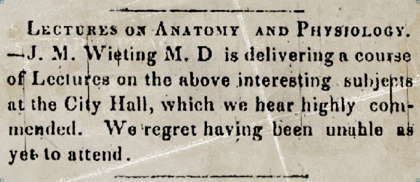The Life of the Mind
working-class intellectual culture
For many young women, the allure of Lowell was the city's vibrant working-class intellectual culture.* Workers read voraciously in Lowell’s city library and Reading Rooms, and subscribed to the large, informal “circulating libraries,” largely composed of novels. Many even pursued literary composition. Defying factory rules, some would even fasten verses to their spinning frames, “to train their memories,” and pin up mathematical problems in the rooms where they worked.
In the evenings, many operatives enrolled in courses offered by the mills, and attended public lectures at the Lyceum, a theatre built at company expense (offering 25 lectures per season for 25 cents). The Voice is rife with notices for upcoming lectures, courses, and meetings on topics ranging from astronomy to music (some of which are reproduced in the section “Lectures and Learning”.)

An notice for a series of lectures on Anatomy and Physiology, published in the Voice on November 11th, 1846.
Lectures & Learning
click to expand
—
Looking on
the Surface
The Blindness
of the Age
Intelligence among the Working People
Think!
The Divinity Within
Our Real Necessities
Improvement of Time
My Experience as an Operative
Romance and Reality
click to expand
—
Wealth and Wisdom
click to expand
romance and reality
The corporations happily publicized the efforts of these “literary mill girls.” They boasted of a leisurely, undemanding factory life that bred the “most superior class of factory operative,” the spectacle of which greatly impressed foreign visitors to Lowell.
But it was a spectacle. By the 1840s, factory conditions had deteriorated sharply, and workers condemned the mills for trading on the image of the “literary mill girl” to mask this grim reality. “Very pretty picture,” wrote one, responding to a sanitized account of life and learning in the mills, “but we who work in the factory know the sober reality to be quite another thing altogether.”
dreary work and mental degradation
The “sober reality” was twelve to fourteen hours a day of dreary, exhausting work that the women experienced as hostile to intellectual development, reducing them into “machines encased in hollow human forms,” unfit for study and reflection. “Who after thirteen hours of steady application to monotonous work, can sit down and apply her mind to deep and long continued thought?” wrote one operative in the pages of the Voice. “Where is the opportunity for mental improvement?"
A former Lowell operative, looking back on her experience in the mills, expressed a similar view: “After one has worked from ten to fourteen hours at manual labor, it is impossible to study History, Philosophy, or Science,” she wrote. “I well remember the chagrin I often felt when attending lectures, to find myself unable to keep awake...I am sure few possessed a more ardent desire for knowledge than I did, but such was the effect of the long hour system, that my chief delight was, after the evening meal, to place my aching feet in an easy position, and read a novel.”
This sentiment - that repetitive and exhausting work was corrosive to mental life - echoed concerns voiced by Adam Smith almost a century earlier. Writing in the Wealth of Nations about the division of labor, Smith noted that a worker “whose whole life is spent in performing a few simple operations...has no occasion to exert his understanding. He naturally loses, therefore, the habit of such exertion, and generally becomes as stupid and ignorant as it is possible for a human creature to become.”
This stupefying effect on the worker's mental life was, for Smith, the most troubling consequence of the division of labor. He argued that it should be limited by the government, through an extensive system of public education.**
the pursuit of riches: a disease beyond remedy
Workers also pointed out that the single-minded pursuit of wealth at the heart of the new industrial system had equally pernicious effects on the minds of the industrialists who imposed it: “Business men,” wrote one operative, “in the general scramble for more, almost or entirely neglect all faculties of the mind but those directly called into action by their love of gain.” This “love and pursuit of riches” not only “choke[s] the mind and dwarfs it,” wrote another operative, “but the disease itself is hopelessly beyond remedy.”
-
* Most of the young women who came to work in the factories had already completed some measure of formal education.
** Smith, contrary to the popular view, was not opposed to all government intervention. He argued specifically that the government should be responsible for protecting society against “violence and invasion," and for the provision of the “administration of justice," for all its citizens. Additionally, he stressed that the government should undertake certain public projects that would not be profitably provided by the private sector (such as education and roads).
In evaluating Smith's concerns, it's worth remembering that he was writing about a society that was in a sense pre-capitalist: it was an ‘immature' capitalism, populated by small-scale manufactures. He did not live to see the large factories that would become the centres of accumulation in the 1840s. As such, the negative effects of capitalism to which he drew attention were arguably much worse by the time they were being urgently expressed by workers in the Voice.















